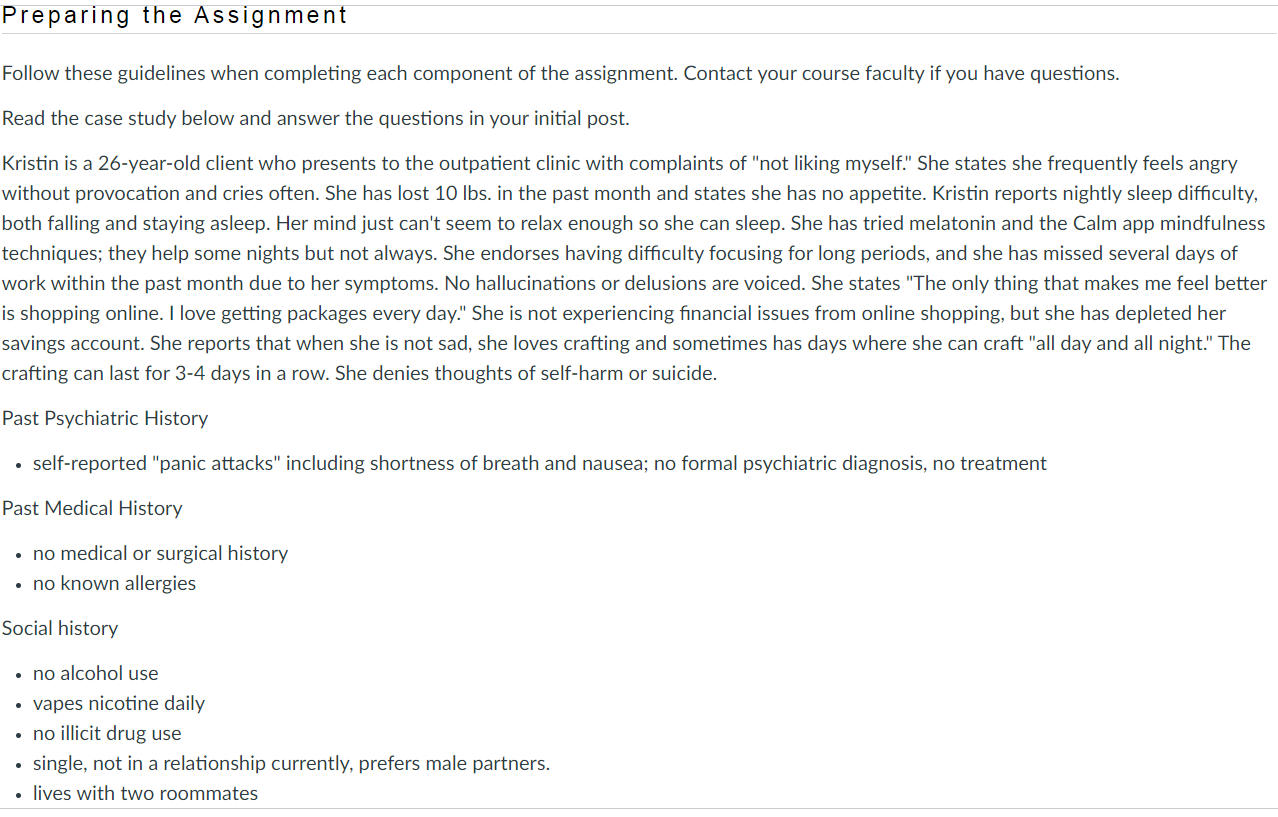CLASS:
NR547: Differential Diagnosis in Psychiatric-Mental Health across the Lifespan Practicum
Preparing the Assignment
Follow these guidelines when completing each component of the assignment. Contact your course faculty if you have questions.
Read the case study below and answer the questions in your initial post.
Kristin is a 26-year-old client who presents to the outpatient clinic with complaints of “not liking myself.” She states she frequently feels angry without provocation and cries often. She has lost 10 lbs. in the past month and states she has no appetite. Kristin reports nightly sleep difficulty, both falling and staying asleep. Her mind just can’t seem to relax enough so she can sleep. She has tried melatonin and the Calm app mindfulness techniques; they help some nights but not always. She endorses having difficulty focusing for long periods, and she has missed several days of work within the past month due to her symptoms. No hallucinations or delusions are voiced. She states “The only thing that makes me feel better is shopping online. I love getting packages every day.” She is not experiencing financial issues from online shopping, but she has depleted her savings account. She reports that when she is not sad, she loves crafting and sometimes has days where she can craft “all day and all night.” The crafting can last for 3-4 days in a row. She denies thoughts of self-harm or suicide.
Past Psychiatric History
- self-reported “panic attacks” including shortness of breath and nausea; no formal psychiatric diagnosis, no treatment
Past Medical History
- no medical or surgical history
- no known allergies
Social history
- no alcohol use
- vapes nicotine daily
- no illicit drug use
- single, not in a relationship currently, prefers male partners.
- lives with two roommates
- educational level: bachelor’s degree
- employment: employed full time as a technical writer, works from home
- hobbies: crochet and papercrafts
Family history
- mother: alive, 55, no medical history, psychiatric history of depression
- father: alive, 57, history of type 2 DM, no psychiatric history
- siblings: only child
Medications
- no prescription medications
Mental Status Examination
Casual attire, well-groomed, no motor abnormalities. Cooperative, good eye contact. Alert and oriented x 3. Speech is clear, normal rate and volume. Mood is depressed, irritable, and angry. Affect is appropriate, congruent to mood. Does not appear to respond to external stimuli. Memory grossly intact, fair concentration and attention. Thought processes are coherent with average intellectual functioning. Thought processes appear organized and content is appropriate to subject. Denies suicidality or homicidality. Insight and judgment are fair.
- Application of Knowledge: The student post demonstrates the application of knowledge.
- Select an appropriate screening tool for Kristin and provide a score for the tool.
- Provide a rationale for the screening tool you selected.
- Determine the most likely diagnosis for Kristin based on the available information.
- Provide the ICD-10-CM code for the selected diagnosis
- Provide a treatment plan with rationale for each plan step.
- Integration of Evidence: The student post provides support from a minimum of one scholarly in-text citation in addition to the textbook.
SOLUTION
Application of Knowledge: Kristin’s Case Study
- Appropriate Screening Tool and Score
Selected Screening Tool:
Mood Disorder Questionnaire (MDQ)
Rationale for Selecting the MDQ:
The Mood Disorder Questionnaire (MDQ) is a screening instrument that has been established to identify bipolar spectrum disorders – of which Bipolar II Disorder is one. According to DSM V, Kristin has features of cyclic mood swings, which are indicative of major depressive disorder and perhaps bipolar II disorder specifically given her arguably hypomanic symptoms which include intense periods of crafting that she prefers to do through the night, decreased need for sleep, increased goal-directed initiative, exacerbated by cutting rather selfishly a huge amount of money on things she never needed online.
- Why MDQ Over Other Tools?
- MDQ effectively distinguishes bipolar disorders from unipolar depression, which can often present with overlapping symptoms.
- It captures lifetime symptom history, which aligns with Kristin’s recurrent pattern of mood fluctuations.
- The episodic nature of Kristin’s symptoms fits well with the MDQ’s structure.
Expected Score:
Based on Kristin’s symptoms, she would likely score positive for bipolar spectrum disorder on the MDQ, meeting criteria for significant mood changes, associated functional impairment, and episodic mood cycles………………………….purchase at $5

Reviews
There are no reviews yet.